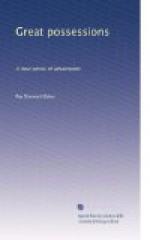[Illustration: All the others meant homes, roof-trees, families, or else, like the tower of the church, they pointed heavenward, and were built to the glory of God.]
He has done his duty in other ways by his time and his place. He has brought up a large family of children; and has known sorrow and loss, as well as happiness and contentment. Two of his children were taken in one day with pneumonia. He told me about it with a quaver in his old voice.
“How long ago was it?” I asked.
“Twenty-seven years.”
He has sons and daughters left, and two of the sons he has well trained as stone masons after him. They are good as young men go in a degenerate age. They insist on working in cement! He has grandchildren in school, and spoils them.
He is also a man of public interests and upon town-meeting day puts on his good clothes and sits modestly toward the back of the hall. Though he rarely says anything he always has a strong opinion, an opinion as sound and hard as stones and as simple, upon most of the questions that come up. And he votes as he thinks, though the only man in meeting who votes that way. For when a man works in the open, laying walls true to lines and measurements, being honest with natural things, he comes clear, sane, strong, upon many things. I would sooner trust his judgment upon matters that are really important as between man and man, and man and God, than I would trust the town lawyer. And if he has grown a little testy with some of the innovations of modern life, and thinks they did everything better forty years ago—and says so—he speaks, at least, his honest conviction.
If I can lay my walls as true as he does, if I can build myself a third part as firmly into any neighbourhood as he has into this, if at seventy years of age—if ever I live to lay walls with joy at that time of life—if I can look back upon my foundations, my heaven-pointing towers, and find no cracks or strains in them, I shall feel that I have made a great success of my life....
I went out just now: the old man was stooping to lift a heavy stone. His hat was off and the full spring sunshine struck down warmly upon the ruddy bald spot on the top of his head, the white hair around about it looking silvery in that light. As he placed the stone in the wall, he straightened up and rubbed his stubby hand along it.
“A fine stone that!” said he.
CHAPTER XI
AN AUCTION OF ANTIQUES
“I would not paint a face
Or rocks or streams or trees
Mere semblances of things—
But something more than these.”
“I would not play a tune
Upon the sheng or lute
Which did not also sing
Meanings that else were mute.”
John Templeton died on the last day of August, but it was not until some weeks later that his daughter Julida, that hard-favoured woman, set a time for the auction. It fell happily upon a mellow autumn day, and as I drove out I saw the apples ripening in all the orchards along the road, and the corn was beginning to look brown, and the meadows by the brook were green with rowen. It was an ideal day for an auction, and farmers and townsmen came trooping from all parts of the country, for the Templeton antiques were to be sold.




